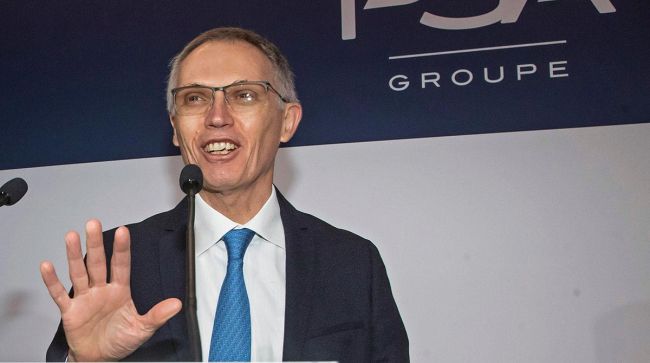Stellantis CEO Carlos Tavares in 2020 by Michel Euler/AP
Stellantis NV’s third battery manufacturing plant in North America will be built with South Korean battery partner Samsung SDI in the United States, the companies said July 24.
The exact location of the second plant under the existing StarPlus Energy joint venture wasn’t disclosed with the announcement of a signed memorandum of understanding, whose execution is subject to definitive documentation. The facility is expected to begin production in 2027 with an initial annual production capacity of 34 gigawatt hours. A dollar amount wasn’t shared.
A location, the companies say, is under review and will be shared at a later date. Mark Stewart — chief operating officer in North America of the maker of Chrysler, Dodge, Jeep, Ram and other vehicles — previously said Michigan had been a part of those discussions. Stellantis had looked at a mega site in Marshall, according to local officials, where Ford Motor Co. now is building a battery plant, despite some public opposition. Stellantis spokesperson Shawn Morgan said Michigan remains an important partner.
Other states, however, also are making major pushes for electric vehicle business. Illinois has passed incentives to attract investments, especially in light of Stellantis indefinitely idling the Jeep Cherokee plant in Belvidere, less than 90 minutes west of Chicago.
#Stellantis and Samsung SDI to build a second StarPlus Energy #gigafactory in the United States. With an initial annual production capacity of 34 gigawatt hours (GWh), it’s intended to be the sixth battery facility to support our #electrification plan: https://t.co/NpDySWHaYa pic.twitter.com/1PBJYsGuK5
— Stellantis (@Stellantis) July 24, 2023
“This new facility will contribute to reaching our aggressive target to offer at least 25 new battery-electric vehicles for the North American market by the end of the decade,” Stellantis CEO Carlos Tavares said in a statement. “We are continuing to add more capacity in the United States together with our great partner Samsung SDI and laying the next steps to reaching our carbon neutrality commitment by 2038.”
Stellantis and Samsung SDI also have increased the expected annual production capacity at launch of their initial battery plant announced in Kokomo, Ind., where Stellantis has a sprawling manufacturing footprint. That plant will have an initial production capacity of 33 gigawatt hours.
The companies had stated that was the capacity to which they expected the plant eventually to expand from an original 23 gigawatt hours that was valued as a $2.5 billion investment with 1,400 jobs created. The plant still is expected to launch in the first quarter of 2025.
Stewart previously said a third and possibly a fourth battery plant would be needed in North America by 2030 to reach the automaker’s ambitions of 50% all-electric sales of passenger cars and light-duty truck in the United States. The company is investing $35.5 billion into electrification and software by 2025. It wants to be carbon net-zero by 2038.
“By establishing the joint venture with Stellantis last year, we laid a solid groundwork for marking our presence in North America,” Samsung SDI CEO Yoon-ho Choi said in a statement. “The second plant will accelerate our market penetration into the U.S. and help Stellantis push forward the U.S. transition to an era of electric vehicles by supplying the products featuring the highest levels of safety and quality.”
The announcement comes after Stellantis earlier this month resumed construction on a module production facility at the battery manufacturing complex in Windsor, Ontario, it’s building with LG Energy Solution. Construction had halted for seven weeks over a disagreement with the Canadian government on incentives it would provide the project. Canada with the province of Ontario ultimately agreed to provide $11 billion in subsidies to match what the United States is offering battery manufacturers under the Inflation Reduction Act.
The $4.1 billion Windsor plant from the NextStar Energy joint venture is expected to have more than 45 gigawatt hours of annual capacity and create 2,500 jobs. It still is expected to launch production next year.
Stellantis earlier this month also kicked off contract negotiations with the United Auto Workers union. Although its battery plants in North America would have to be organized by the UAW and its Canadian counterpart Unifor, the talks are expected to set a precedent for wages, benefits and other conditions affecting workers at joint-venture battery plants starting with Ultium Cells’ plant in Warren, Ohio, a partnership between General Motors Co. and LG Energy Solution.
In addition to the three battery plants planned for North America, Stellantis is building battery plants in France, Germany and Italy. The company is securing 400 gigawatt hours of capacity to meet its production goals by 2030.






